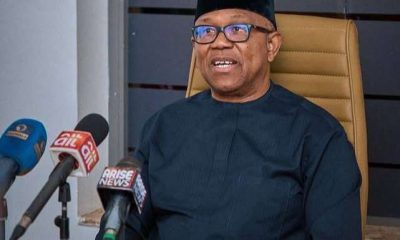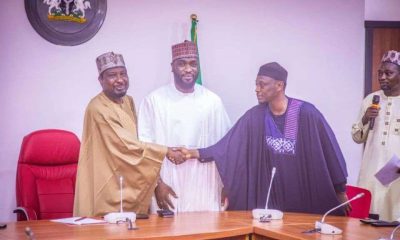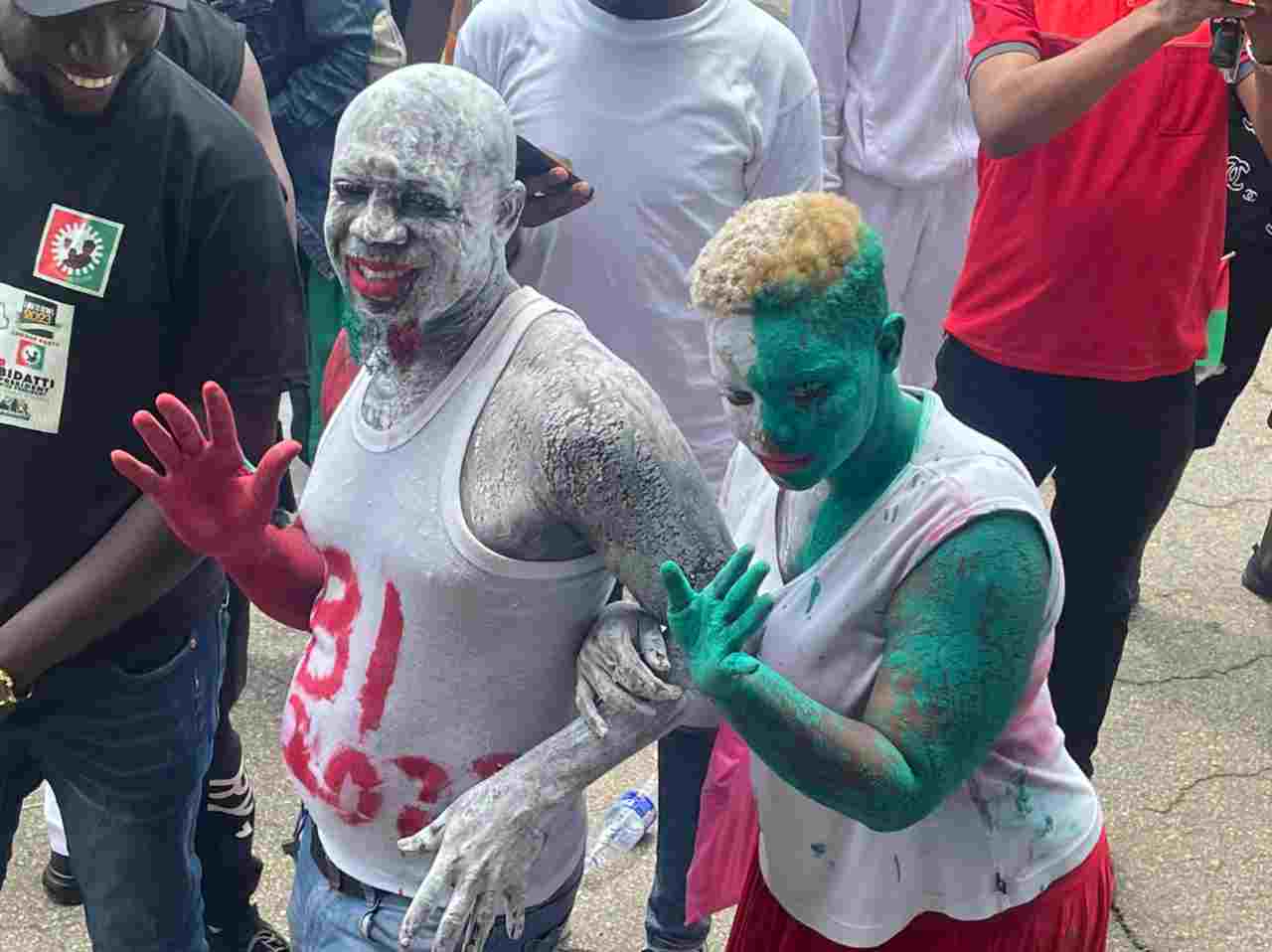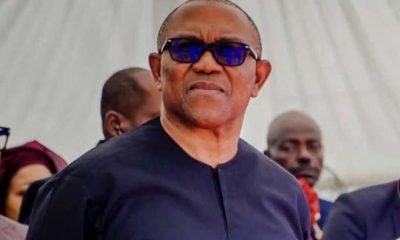Headlines
2023: Peter Obi rides youth rage, threatens establishment

By OBINNA EZUGWU
Though not necessarily a political outsider, Mr. Peter Obi, former Anambra State governor had entered the 2023 presidential contest as an underdog.
Up against septuagenarian political veterans with deep pockets in the mould of Alhaji Atiku Abubakar, Nigeria’s former vice president and candidate of the People’s Democratic Party (PDP), and Bola Tinubu, former governor of Lagos State and candidate of the All Progressives Congress (APC), the idea of the former Anambra State governor challenging for Nigeria’s highest office in a small party like Labour would ordinarily seem like trying to do the impossible.
But he is proving doubters wrong. In Nigeria’s 23 years of interrupted democracy, power has been shared between the PDP, the main opposition party which lost it in 2015 after 16 years at the helm, and the current ruling party, APC, which came into power in 2015.
Between them, they share 35 states and an overwhelming majority of national and state assembly seats, what has come to be known as “structure,” which in addition to parading formidable political figures in Tinubu and Atiku are the ideal favourites.
But the last seven years of Muhammadu Buhari presidency have seen two recessions, spike in unemployment and inflation rates, and unprecedented insecurity. Mass disaffection among the populace about the prevailing situation found expression in the EndSARS protest of 2020, the closet the country has ever come to a mass revolution.
Triggered by the excesses of the now disbanded Special Anti Robbery Squad (SARS) of the Nigerian Police Force, a unit notorious for its brutality, the protest soon assumed a life of its own. Youths in their thousands in various states marched in the streets demanding far reaching reforms. But the protest was eventually crushed in the infamous Lekki tollgate incident.
No longer in the streets, the youths took the agitation to social media, where the street protest was mobilized in the first place, to continue to demand change; a total departure from the present political order.
But the leading parties opted for Atiku and Tinubu, considered to be part of the “ruinous establishment,” after primary elections that were basically a contest of pockets. The disillusioned youth population needed an alternative; a sort of fresh air, and found that in Peter Obi, who, when, crowded out of the PDP, opted to join Labour Party and subsequently became its presidential candidate.
“The young ones want to see a country with a future,” Obi told Reuters last week. “My job is to take the country and give it to them.
“The system they’ve operated over the years, it has brought us to where we are… What is important is that people trust… It is simple. You may not like me. But what I’m coming here to do will be different.”
A few months ago, not many people could have imagined the possibility of a third force; another political platform that could rival the two big parties going into 2023, but Obi is crystallising that third force. Now the rallying point for many who say they’re tired of the status quo, Obi is generating excitement among many, and is proving to be a real factor in 2023.
“We’re tired of the PDP and the APC, we want to try something new. People are suffering, people are hungry,” said Chidinma Emezuom, a young graduate in Ojodu, Lagos State.
“We want Peter Obi, he’s younger, energetic, and knows what he’s talking about. They say we, his supporters, are only on social media, but we will see when election comes.”
The former Anambra State governor is way more popular than Atiku and Tinubu on social media. He’s consistently trounced both in online polls.
But the supporters of the two big parties say he’s just about social buzz that would eventually peter out, even as there have been spirited attempts to link him with the Indigenous People of Biafra (IPOB), a group agitating for a separate state of Biafra for the Igbo, his ethnic group.
Few days ago, for instance, Abdullahi Adamu, national chairman of APC argued Obi, though popular on social media, can only win votes in his native Southeast geopolitical zone, and South South, close door neighbour to the Southeast.
According to Adamu who spoke in an interview with Trust TV, “Obi will take votes in the Southeast and probably South South, which are normally PDP strongholds. This is good for us in the APC because it would help our course. I don’t think that would be enough for him to pose a challenge, but it means that we will be in a better position to win.”
But such confidence may seem misplaced as other more objective assessment of the movement now admit that indeed, something big and different is in the air.
One such opinion camp came from a chieftain of APC, Chief Femi Fani-Kayode, former Aviation minister, in an article that is still generating reactions.
“The truth is that they are far more dangerous to our collective cause as a ruling class than many of us can possibly conceive or appreciate. Only the discerning can appreciate this and know precisely where this whole thing may be heading.
“They may not have structures or elected representatives in the legislative and executive arms of government but they have IDEAS and VISION, coupled with a clear ideological and philosophical bent which can and will endure for far longer than mere political platforms and structures.
“Unknown to them, as well as virtually everyone else, therein lies their power. As they say, an idea whose time has come cannot be stopped…
“They also represent a generational and paradigm shift, which is increasingly attractive to many, and they are bound tightly together by a common purpose, common cause and common objective: namely to rid Nigeria of the old order and usher in the new…”, he wrote.
Regardless, it is a country that religion and ethnicity define politics, and ideally, Obi, a Christian from the Southeast is holding the wrong end of the stick compared to Atiku and Tinubu. Northern states, predominantly Muslim, have turned out large vote numbers in recent years, and Atiku, a Muslim northerner, and Tinubu, a Muslim from the Southwest, are more fancied to win their regions.
Many had indeed ridiculed Obi in this regard, arguing that he’s a non-starter. A fortnight ago, Nasir El-Rufai, Kaduna state governor, mocked a planned rally for the Labour Party candidate in Kaduna.
An Obi supporter, Abdullahi Umar Zarma, had tweeted a call for a two-million man march in Kaduna for him. Quoting the tweet, El-Rufai dismissed the possibility of 200 persons coming for the rally and referred to south-easterners as ‘imports’.
“In Kaduna? Not Kaduna Twitter? – I hope you get Two Hundred persons on the streets… including those ‘imports’ that can’t open their shops on Mondays, and came on overnight bus last night!! I jus’ dey laff, wallahi tallahi!!”
But Obi, is getting more support in the north than his opponents care to admit. Labour Party rallies have witnessed turnout of people across the country.
Ravaged by insecurity, with attendant bloodshed, the like of which had never been seen in peacetime Nigeria, many in the north that welcomed Buhari to power in 2015 with fanfare, say they are also tired and want a Nigeria that works.
“My children are in the house today, they can’t go to school. Today, I can’t buy foodstuffs with N20,000, and you’re telling me it’s about Peter Obi? You’re telling me it’s about religion?” wondered Comrade Farouk Datsama, Deputy chairman of Labour Party in Kaduna.
“I feel pained when an Igbo man tells me I’m marginalizing them, because I’m more marginalized than them, even with my own people ruling. It is not about Peter Obi, it is about my freedom; it’s about my children’s freedom and it’s about Nigeria’s freedom.”
Datsama, who lamented the prevailing insecurity in the north, noted that his people are being slaughtered and prevented from going to the farm. He said at some point, the decided to arm themselves in self defense, but the governor opposed the move.
It is perhaps not in doubt that Tinubu is likely to win in his Southwest by a good margin, and it’s also likely that himself and Atiku would be the strongest contenders for the votes in the core northern states.
However, a survey by Business Hallmark, a fortnight ago, in Lagos showed that Obi is more popular than many care to admit, and his popularity is not only among people of Southeast or South South origin. Many South Westerners spoken to also expressed strong support for Peter Obi, citing “failure of the PDP and the APC.”
“What is it that Tinubu wants?” wondered Folorunso Samuel, a retiree at Ikeja,” What he has gotten from Lagos is not enough for him? What else does he want? People cannot even afford to buy bread anymore, yet they are asking us to vote APC? No; we are tired of them. We no longer want both APC and PDP.”
Indeed, while many tend to believe that the Obi movement is only on social media, evidence shows that his supporters are actively mobilizing support at the grassroots.
“Social media is very important instrument in winning elections,” argued F.S. Yusuf, a member of the ‘Obedient’ movement, the name supporters of the former Anambra governor have come to be known.
“But social media is not my fear, my fear is INEC. The efficacy of social media will depend on the credibility of INEC,” Yusuf said on Arise TV last week.
“On social media, what we ‘Obedients’ do is that we bring our reports from grassroots mobilization that we have been doing. In fact, we have also used social media to encourage more Nigerians to register to vote, and now that registration has ended, we’re focused on encouraging people to get their PVCs.”
In 2015, Muhammadu Buhari, then presidential candidate of the APC, swept to power on the back of strong support from Tinubu, promising to stem the menace of corruption which was widely believed to be prevalent under the then ruling PDP, end insecurity and grow the economy.
But seven years down the road, the economy is in six and sevens, poverty has spiked, inflation came in at 19.64% in July 2022, from 15.75% in June and with food inflation spiking to 22.02% from 20.6% recorded in June.
Insecurity has also gone from a largely Northeast affair to a nationwide tragedy, with bandits operating mostly in the Northwest and North Central adding new dimension to the harvest of terror in the country.
Corruption in the estimation of many has also got worse. The naira, which for many is a measure of the strength of the economy, has gone from about N200 to the dollar in 2015, to around N700 to the dollar in 2022 at the open market, with an unprecedented rise in prices of commodities.
Anger and frustration have continued to build, and try as they have, the Tinubu campaigners have been unable to extricate him from the failures of the APC government, while many say they are not keen on PDP’s return to power either, especially with Atiku, it’s candidate also having a reputation for being “corrupt” and Tinubu’s image not being a corrupt-free one.
“Both PDP and APC are one and the same,” said Olagoke Lateef in Ketu, Lagos. “Tinubu and Atiku are one of a kind. We want fresh air, we want a new Nigeria.”
Obi, who is the most visible alternative, and who has good track record in many people’s reckoning, in addition to being much younger at 61, than Tinubu and Atiku in their 70s, has become the very attractive alternative.
“Peter Obi has made all of them (PDP and APC) jittery,” said veteran broadcast journalist, Jimi Disu. “Both the Tinubu and Atiku camps are now facing Peter Obi.
“But the sweetest thing about this Peter Obi movement is that it is organic. He doesn’t pay people to support him, it comes from the heart of the people, and the evidence is there.
“The fact is that all of them are jittery about Peter Obi. He took them by surprise, he even took me by surprise. We just woke up one day and all over the place, people are talking about Peter Obi.”
Tinubu, former Lagos State governor and a Muslim from the Southwest geopolitical zone, had in June named Kashim Shettima, a former governor of Borno State, Northeast, and a fellow Muslim as his running mate, shunning the argument against Muslim-Muslim ticket in the event.
Though for the Lagos politician, the logic is simple … he expects to win his Southwest zone, irrespective of the religion of his running mate, and will find it difficult in the Southeast and South South, while the core north on the other hand, where he expects to get the votes, is predominantly Muslim, and religion is a huge part of the region’s politics… the backlash against the move is proving to be stronger than he could have anticipated.
Northern APC Christians and other Christians stakeholders in the region have since gone up in arms against the ticket. Led by Babachir Lawal, former secretary to the government of the federation and Hon. Yakubu Dogara, former speaker of the house of representatives, the Christians had in a summit last month in Abuja, argued that the Muslim-Muslim ticket is part of a “plot to marginalize them and islamize Nigeria.”
The umbrage among northern Christians over the Muslim-muslim ticket shows no sign of abating, and stems from a long history of facing marginalisation in the region. Tinubu, while seeking to appeal to the Muslim voting bloc in the north may have succeeded in alienating a significant section of the northern demographic, which may indeed haunt him at the February polls.
But neither Atiku nor Tinubu is having a smooth sail. While the fact of the former vice president being a northerner running against a southerner will be a plus for him as far as northern votes are concerned, he is likely going to struggle in the Southeast and South South, more so in the former, hitherto PDP strongholds, with the emergence of Obi.
“I think there is a tendency, especially among the more established parties, to underrate the impact of Peter Obi,” said Chidi Anthony,” Abuja based lawyer and public affairs commentator.
“I’m of the opinion that he would surprise many. He has huge youth support across the south and the middle belt, perhaps even across the country. They can keep arguing that he is social media phenomenon.”
In 2019, Atiku swept southeast, south south and parts of the middle belt while also getting good numbers in the Southwest, but ultimately came short as Buhari won a second term, even if his victory was contentious.
A good number of those who voted Atiku in 2019, considering him as a better option than Buhari, are rooting for Obi ahead of 2023, and for the former vice president, that is a cause for worry.
This is even as his decision to name Dr. Ifeanyi Okowa, Delta state governor, as his running mate, has alienated Nyesom Wike, governor of Rivers state who was said to have been preferred by majority of the governors and members of the national working committee; a situation that has triggered a crisis in the party, which remains unresolved.
Yet, for the two leading candidates, the Obi factor and the Muslim-muslim ticket controversy are not the only issues to worry about.
As at the last count, there are at least 10 suits challenging their candidacy; cases ranging from frivolous to potentially damaging ones, even so, as in the case of Tinubu, he’s had a hard time shaking off his alleged drug dealing and certificate scandals, which once again, resurfaced to haunt him.













